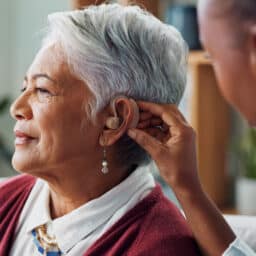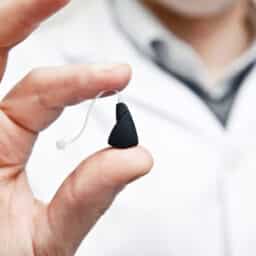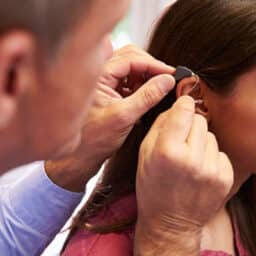What You Need to Know About Winter Weather and Hearing Aids

Winter weather is gorgeous and crisp, but it presents unique challenges for the nearly 30 million American adults who need hearing aids. Cold weather can affect the functionality of your hearing aids, and winter condensation can cause moisture damage. Let’s review why this is the case and explore ways to keep your hearing aids in…
How Hearing Aids Help at the Grocery Store

If you’re suffering from hearing loss, you know that it does more than just turn the volume down; it makes everyday tasks much more complicated and disconnects you from the world around you. Running errands, such as going to the grocery store, can be stressful, overstimulating and frustrating. Challenges at the Grocery Store with Hearing…
Why Does Wearing My New Hearing Aids Make Me Tired?

Congratulations on your new hearing aids! You’re on your way to clearer hearing and confident communication. As you begin adjusting to wearing them throughout your daily life, it’s common to feel tired at the end of the day. What you’re experiencing is auditory fatigue, and it’s due to your ears and your brain both working…
Can a Thyroid Disorder Impact Hearing Health?

It may come as a surprise that thyroid disorders are linked to hearing health, but there is increasing research suggesting just that. If you’ve been diagnosed with a thyroid disorder, it’s a good idea to examine how that might affect your ears. What Does the Thyroid Do? The thyroid is a gland in your neck…
How To Properly Clean Your Hearing Aids

Your hearing aids keep you connected to the vibrant world of sound, and keeping them in working condition is essential. Being proactive with cleaning and hearing aid maintenance is the best way to ensure their longevity and optimal performance. We’ve compiled a comprehensive guide on cleaning your hearing aids. How Often Should I Clean My…
Understanding the Differences Between Misophonia and Hyperacusis

Understanding the Differences Between Misophonia and Hyperacusis Both misophonia and hyperacusis are conditions related to heightened sound sensitivity, but they affect people in very different ways. While the symptoms may overlap, the causes and types of reactions they trigger are unique. Knowing these differences can lead to better diagnosis and more effective treatment strategies. What…
Improving Podcasts and Audiobooks for People With Hearing Loss

For the nearly 15% of U.S. adults living with hearing loss, following along with podcasts, audiobooks or other spoken media can be a challenge. But hearing loss doesn’t have to mean missing out. By embracing a few tools and strategies, audio entertainment can still be both accessible and enjoyable. Enhancing Audio Content for All Whether…
Can I Sleep With Hearing Aids In?

Hearing aids can help you hear better in various environments and improve your communication. If you’re new to hearing aids, you might wonder whether it’s safe or helpful to wear your hearing aids while you sleep. While it may seem like a good idea to keep them in all the time, especially if you want…
Improving Podcasts and Audiobooks for People with Hearing Loss

Living with hearing loss can make it tough to enjoy podcasts, audiobooks or other audio-based content. With nearly 15% of adults in the U.S. experiencing some level of hearing loss, this is a common issue. Luckily, with a few smart adjustments like tech upgrades and listening routines, people with hearing loss can still enjoy audio…
Maximizing the Lifespan of Your Hearing Aids: Essential Care Tips
Hearing aids are a life-changing tool, restoring clarity to conversations and improving awareness and overall well-being for people with hearing loss. Like any tech, hearing aids require regular care to ensure peak performance and longevity. Let’s take a look at how well-maintained hearing aids add to your life and a few practical tips to keep…